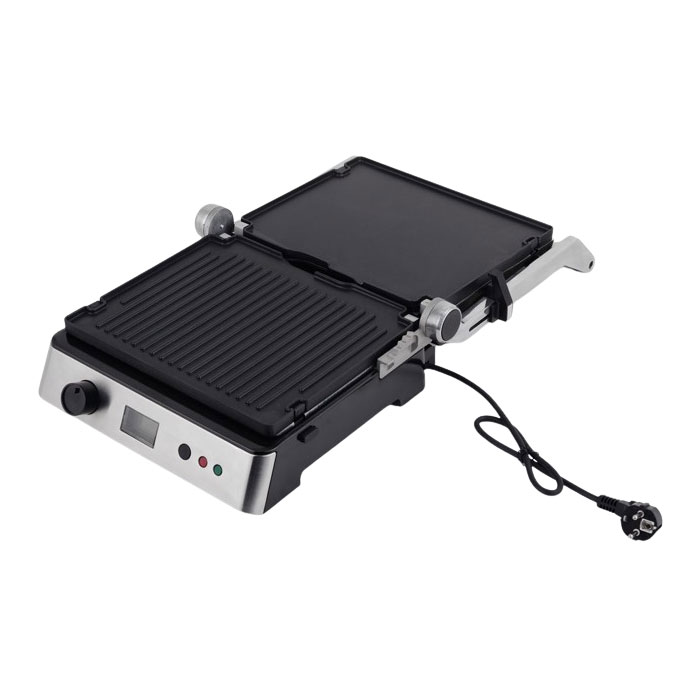What food-grade material standards must the components of an electric contact grill meet?
Components of electric contact grills must meet a range of food-grade material standards to ensure they do not pose a health hazard when in contact with food. Here are some key food-grade material standards and requirements:
1. Material Safety Standards:
FDA Standards: The FDA sets standards for food-grade materials to ensure they do not release harmful substances when in contact with food. Metal components of the grill must comply with FDA regulations on food contact substances to ensure they do not decompose or release harmful substances during use.
EU Regulation (EU) No. 1935/2004: This regulation mandates that all materials in contact with food must meet health and safety requirements. All components of the grill, such as heating elements, cables, and metal supports, must comply with these regulations.
GB 4806 Series: In China, components of electrically contact grills must comply with relevant standards for food contact materials, such as the "General Safety Standard for Food Contact Materials and Articles" (GB 4806.1-2016) and specific standards for different materials.
2. Metal Material Requirements:
Stainless Steel: Most electric contact grills use stainless steel as the primary metal material due to its corrosion resistance, high-temperature resistance, ease of cleaning, and compliance with food safety standards. The stainless steel surface must be free of harmful substances or impurities and requires appropriate surface treatment to prevent reactions with food and airborne substances.
Aluminum Alloy: Some grills may use aluminum alloy, but it is essential to ensure that the aluminum alloy meets food-grade requirements and avoids containing heavy metals or failing to meet high-temperature resistance standards.
Coating Materials: The coating of the grill pan, heating surface, and grill itself must comply with FDA or EU food safety standards, ensuring that the coating does not peel, deteriorate, or release harmful substances.
3. Plastic Material Requirements:
High-Temperature Resistance: The plastic parts of the grill must use high-temperature resistant, food-grade plastics, commonly polycarbonate and polytetrafluoroethylene (PTFE). These materials will not deform or release harmful substances at high temperatures.
Non-Toxic: Plastic materials must meet non-toxic standards, such as FDA requirements for food-grade plastics, ensuring that no harmful chemicals or additives are released during the grilling process.
4. Safety of Electrical Components:
Cables and Plugs: The cables, plugs, and electrical control components of the grill must meet food safety and electrical safety requirements to prevent toxic substances from seeping into the food. The external insulation material of the wires must be heat-resistant, non-toxic, and harmless, and comply with relevant electrical safety standards.
Protective Design: All electrical components should have protective designs to prevent the release of harmful substances due to electrical short circuits or overheating during heating.
5. Durability and Cleaning Requirements:
Corrosion Resistance: Grill components should be corrosion-resistant, heat-resistant, and easy to clean. Food contact materials should be designed to be stain-resistant and oil-resistant to ensure that bacteria or contamination are not easily generated.
Prevention of Odor and Flavor Residue: All materials, especially heating elements and surfaces, should not absorb food residue or produce odors during grilling, ensuring the taste and safety of the food.
6. Compliance with Relevant Certifications and Marks:
Food-Grade Marks: Products should bear relevant food-grade certification marks, such as FDA, LFGB (German Food Contact Materials Standard), and NSF (National Sanitation Foundation). These certifications ensure that the materials meet food contact safety standards.
Environmentally Friendly Materials: Many manufacturers also consider environmental requirements, using harmless materials and materials that comply with environmental regulations such as RoHS and REACH to ensure product sustainability and safety.
Summary: Components of electric contact grills need to use materials that meet food-grade standards to ensure that they will not harm food during high-temperature grilling. These materials need to be heat-resistant, corrosion-resistant, non-toxic, harmless, and easy to clean, and their safety must be verified through relevant certifications and regulations. Ensuring the compliance of these materials protects consumer health and safety.






